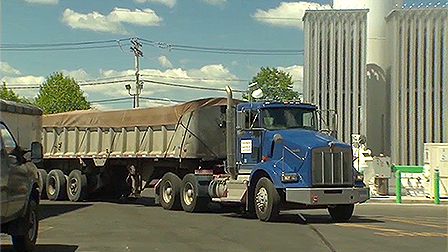Nov. 21, 2013
Cities Make the Clean Switch to Natural Gas (Text Version)
This is a text version of the video segment Cities Make the Clean Switch to Natural Gas, which aired on Nov. 21, 2013.
JOHN DAVIS: The infrastructure for natural gas vehicle refueling is expanding rapidly across the United States as more fleets discover the benefits of this abundant domestic fuel and commit to making the clean switch.
At the crossroads of the West, Salt Lake City, Utah's first refueling station that provides both liquefied and compressed natural gas is now open for business. The station can fill a wide variety of vehicles that run on either LNG or CNG. Both are clean burning, but natural gas is super-cooled to -260?F to create LNG. That allows much more fuel to be stored in a smaller tank. That's important for the big rigs that need to drive long distances. But this station can also supply CNG for use in smaller vehicles that are used locally.
MERRITT NORTON: We aren't limited by pressure; we can fuel up as many cars and light trucks as come to the station pretty much as fast as they can pull in, 24 hours a day.
JOHN DAVIS: This and two additional stations will allow long-distance truckers to carry loads from northern Utah all the way to the southern California coast, making the Beehive State a leader in alternative fuels for the long haul.
The first LNG/CNG fueling station east of the Mississippi can be found in Bridgeport, Connecticut. Owned by Enviro Express Natural Gas LLC, this refueling depot stores nearly 15,000 gallons of liquefied natural gas. The station services the firm's new fleet of 18 LNG Class 8 tractors that are used to haul ash to a state landfill about 200 miles away. The station also provides compressed natural gas to local company and municipal fleets. Funding came from a $6.2 million federal matching grant for the Connecticut Clean Cities Future Fuels project. The new tractors will displace over 500,000 gallons of diesel fuel annually. Drivers are pleased with the way they operate.
KARL STANGE: They like the trucks. There's no power loss. If anything, you know, these have 75 more horsepower than our previous max that we used to operate.
JOHN DAVIS: Thirty-five miles north of Bridgeport in Meriden, Connecticut, is another new station, this one dedicated to CNG. The City Public Works Department employs eight Honda Civic GXs for use by their inspectors.
Two refueling efforts that strengthen easy access to cleaner alternative fuels in the Constitution State.
Working with the Omaha, Nebraska, Metropolitan Utilities District, Happy Cab Company has just completed building public-access compressed natural gas pumps at their I80 fuel station. Funding from the Department of Energy through the Kansas City Regional Clean Cities coalition helped to pay for the project, which includes 50 taxis that are being converted to CNG. It's hope that private fleets will spur the development of the first alt fuel corridor in Nebraska. Happy Cab expects to convert more of their 200-plus cab fleet in the future.
JOHN DAVIS—HAPPY CAB DIRECTOR OF OPERATIONS: We thought it's a great idea, and we were really excited about being on the leading edge of this project here in Omaha.
JOHN DAVIS: Operators will save about $210 a week in fuel costs per cab. That should pay back the CNG conversion cost within a year, a happy outcome for a Nebraska cab company doing its part to drive green.
Lower Merion Township in Montgomery County, Pennsylvania, has been a leader in alternative fuels since 1995, as the state's first school district to start operating compressed natural gas school buses. Today nearly half of their 114 buses run on CNG, making it one of the largest such fleets on the East Coast. Recently named as one of the top five government green fleets in North America, plans are to go all CNG once more fueling stations become available.
GERALD RINEER: There are additional manufacturers that are coming out with new engines and new equipment, so that it will be more cost effective. And we're optimistic that it's the right thing to do and it's going to help clean up the environment.
JOHN DAVIS: Working with the Greater Philadelphia Clean Cities program, Lower Merion is showing its longstanding commitment to sustainable, eco-friendly practices in the Delaware Valley.
Compressed natural gas refuse trucks are a common sight in Richmond, Virginia. The city has acquired 25 high-compaction CNG trucks, along with two natural-gas-fueled Honda Civics. Federal incentives and support from Virginia Clean Cities helped offset vehicle costs. A private 13-stall CNG fueling station was also built to automatically time-fill vehicles overnight. City officials say the environmental benefits of CNG are huge; their refuse trucks emit less carbon dioxide and soot than diesel, with big savings in fuel cost.
CHRIS BESCHLER: Over the two years that we've had the refuse trucks we've saved approximately $400,000 in fuel costs, about $200,000 annually, and we've displaced just shy of 300,000 gallons of diesel fuel.
JOHN DAVIS: There's also a new public-access CNG station that's used by the city's fleet, as well as the Greater Richmond Transit Company's Paratransit buses. With plans for more alt fuel vehicles, Richmond is leading the way for the Commonwealth of Virginia.
